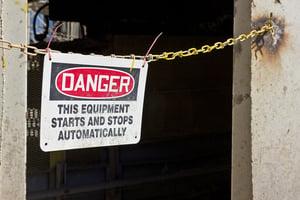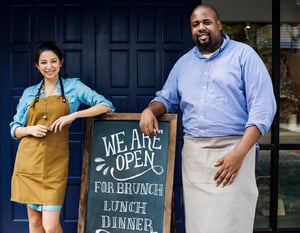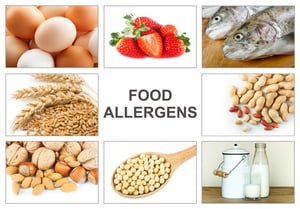.jpg?width=300&name=Business_Interruption_Insurance%20(2).jpg) Do you have Business Interruption coverage for your business? No? Let me ask you this… What would you do if there was a fire in your building, and you were forced to shut down while repairs were made?
Do you have Business Interruption coverage for your business? No? Let me ask you this… What would you do if there was a fire in your building, and you were forced to shut down while repairs were made?
If your business is shut down, you probably won’t have customers. If you don’t have customers, you probably won’t have any income to pay yourself or your employees. According to FEMA, nearly 40% of small businesses never reopen following a disaster.
That’s where Business Interruption Insurance can help.
What is Business Interruption Insurance?
Business Interruption Insurance (Aka Business Income) is typically an endorsement that can be added to most Commercial Property Insurance policies. It protects your business income that is a direct result of a loss, damage, or destruction of your property that is covered by your Commercial Property Insurance.
Additional Coverage to Consider
Extended Period of Indemnity
Some policies include a 30-day extension beyond the standard period of restoration; however, you may need more than the 30-day extension. Sometimes, it takes a while to get a business up and running following an extended closure. Therefore, you may want to consider buying an extended period of indemnity option endorsement, which increases that 30-day extension in multiples of 30, up to 720 days.
Extra Expense Coverage
If your property is damaged, you may incur additional expenses to keep your business running. Those expenses could include the cost of moving to a temporary site, leasing equipment, paying overtime, etc. Extra Expense coverage pays for expenses that are above and beyond your normal operating costs but are required to keep your business running after your property is damaged.
Service Interruption Coverage
One in four companies experience a power outage at least once a month, according to Bloom Energy, and it’s estimated to be costing the U.S. economy $150 billion annually.
If a utility company – such as electrical, gas, water, telephone, etc. – experiences damage to a property that is not on your premises but causes an interruption in your business operations, or an actual financial loss, Service Interruption Coverage may kick in.
Contingent Business Interruption (CBI)
CBI covers your business income loss that is a result of loss, damage, or destruction of properties owned by suppliers of goods and services that you need to run your business. The damage must be the type of damage that your Commercial Property Insurance policy covers.
Leader Property Endorsement
This endorsement helps protect your business if an off-premises facility within a certain distance of your property incurs property damage that affects your business. This endorsement is good for restaurants that rely on the customers coming from another venue, such as a casino, stadium, or amusement park.
Interruption by Civil or Military Authority
If a civil or military authority denies you access to your property, this type of policy may cover lost business sustained during the time you are denied access. This type of thing can happen during a hurricane, winter storm, flood, etc.
How to Save Big on Business Interruption Insurance
Sometimes it’s hard to think of every risk that your business may face, and insurance policy verbiage can be complicated. This is why an experienced insurance agent is vital if you want to understand your risks and options and protect your business.
The independent agents at American Insuring Group specialize in Commercial Insurance. They can not only ensure that you have the right coverage they can also ensure that you pay the lowest price for that coverage by shopping among many competing providers for you. Give us a call at (800) 947-1270 or (610) 775-3848 or connect with us online.



 When it comes to increasing workplace safety and reducing
When it comes to increasing workplace safety and reducing  Keeping workers safe helps businesses save money with lower
Keeping workers safe helps businesses save money with lower  If you are a restaurant owner or manager, you already understand how vital a clean kitchen is to the safety of your customers. But have you ever considered how a clean kitchen can save you money, such as lowering your
If you are a restaurant owner or manager, you already understand how vital a clean kitchen is to the safety of your customers. But have you ever considered how a clean kitchen can save you money, such as lowering your  If you’re trying to set your restaurant apart, you may consider offering valet service. This service could make sense if you have limited parking at your restaurant or just want to offer a service that goes above and beyond what is expected.
If you’re trying to set your restaurant apart, you may consider offering valet service. This service could make sense if you have limited parking at your restaurant or just want to offer a service that goes above and beyond what is expected. There is no denying that we live in a litigious society, and restaurants are not immune to lawsuits. In fact, the very nature of the business often makes them more vulnerable to lawsuits. Don’t believe us?
There is no denying that we live in a litigious society, and restaurants are not immune to lawsuits. In fact, the very nature of the business often makes them more vulnerable to lawsuits. Don’t believe us? The best way to reduce
The best way to reduce  Restaurant Insurance
Restaurant Insurance If you want to keep your Workers’ Comp insurance costs down, you need to
If you want to keep your Workers’ Comp insurance costs down, you need to  Are food allergies affecting the cost of your restaurant liability insurance? Maybe.
Are food allergies affecting the cost of your restaurant liability insurance? Maybe. 



